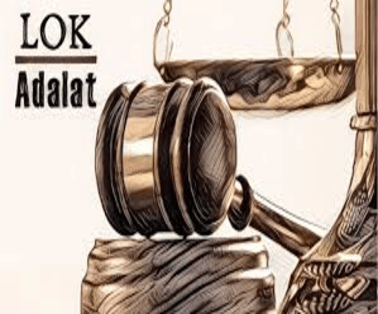The Kalaburagi bench of the Karnataka High Court recently observed that proceedings of a Lok Adalat overseen by a judicial officer are not judicial in nature as the officer “is not entitled to discharge the job of a judge and his role is only that of a conciliator”.
Key Points
- The observations were made in an order passed by a single-judge bench of Justice V Srishananda on March 18.
- The petitioner in this case was challenging a decree of the Lok Adalat which had been referred to it in a trial court in 2007.
- At the time, the petitioner was a minor represented by her grandfather in a property matter and a compromise petition had been allowed by the Lok Adalat.
- Therefore, by sheer logic, it would result that the Lok-Adalath cannot entertain an application filed under Order 23 Rule 3 of CPC or for that matter, any other applications where judicial orders are required to be passed.”
- The bench then dismissed the Lok Adalat decree, placing the matter again before the civil court, adding that the suit had to be wound up by the end of 2024.
What is Lok Adalat?
- The term ‘Lok Adalat’ means ‘People’s Court’ and is based on Gandhian principles.
- As per the Supreme Court, it is an old form of adjudicating system prevailed in ancient India and its validity has not been taken away even in the modern days too.
- It is one of the components of the Alternative Dispute Resolution (ADR) system and delivers informal, cheap and expeditious justice to the common people.
- The first Lok Adalat camp was organised in Gujarat in 1982 as a voluntary and conciliatory agency without any statutory backing for its decisions.
- In view of its growing popularity over time, it was given statutory status under the Legal Services Authorities Act, 1987. The Act makes the provisions relating to the organisation and functioning of the Lok Adalats.
- NALSA along with other Legal Services Institutions conducts Lok Adalats.
Features of Lok Adalat
- Under the said Act, the award (decision) made by the Lok Adalats is deemed to be a decree of a civil court and is final and binding on all parties and no appeal against such an award lies before any court of law.
- If the parties are not satisfied with the award of the Lok Adalat though there is no provision for an appeal against such an award, but they are free to initiate litigation by approaching the court of appropriate jurisdiction by filing a case by following the required procedure, in exercise of their right to litigate.
- There is no court fee payable when a matter is filed in a Lok Adalat. If a matter pending in the court of law is referred to the Lok Adalat and is settled subsequently, the court fee originally paid in the court on the complaints/petition is also refunded back to the parties.
- The persons deciding the cases in the Lok Adalats are called the Members of the Lok Adalats, they have the role of statutory conciliators only and do not have any judicial role; therefore they can only persuade the parties to come to a conclusion for settling the dispute outside the court in the Lok Adalat and shall not pressurize or coerce any of the parties to compromise or settle cases or matters either directly or indirectly.
- The Lok Adalat shall not decide the matter so referred at its own instance, instead the same would be decided on the basis of the compromise or settlement between the parties. The members shall assist the parties in an independent and impartial manner in their attempt to reach amicable settlement of their dispute.
Levels And Composition Of Lok Adalats
- At the State Authority Level
The Member Secretary of the State Legal Services Authority organizing the Lok Adalat would constitute benches of the Lok Adalat, each bench comprising of a sitting or retired judge of the High Court or a sitting or retired judicial officer and any one or both of- a member from the legal profession; a social worker engaged in the upliftment of the weaker sections and interested in the implementation of legal services schemes or programmes.
- At High Court Level
The Secretary of the High Court Legal Services Committee would constitute benches of the Lok Adalat, each bench comprising of a sitting or retired judge of the High Court and any one or both of- a member from the legal profession; a social worker engaged in the upliftment of the weaker sections and interested in the implementation of legal services schemes or programmes.
- At District Level
The Secretary of the District Legal Services Authority organizing the Lok Adalat would constitute benches of the Lok Adalat, each bench comprising of a sitting or retired judicial officer and any one or both of either a member from the legal profession; and/or a social worker engaged in the upliftment of the weaker sections and interested in the implementation of legal services schemes or programmes or a person engaged in para-legal activities of the area, preferably a woman.
- At Taluk Level
The Secretary of the Taluk Legal Services Committee organizing the Lok Adalat would constitute benches of the Lok Adalat, each bench comprising of a sitting or retired judicial officer and any one or both of either a member from the legal profession; and/or a social worker engaged in the upliftment of the weaker sections and interested in the implementation of legal services schemes or programmes or a person engaged in para-legal activities of the area, preferably a woman.
Types of Lok Adalat
- National Lok Adalat
- National Level Lok Adalats are held for at regular intervals where on a single day Lok Adalats are held throughout the country, in all the courts right from the Supreme Court till the Taluk Levels wherein cases are disposed off in huge numbers.
- From February 2015, National Lok Adalats are being held on a specific subject matter every month.
- Permanent Lok Adalat
- The other type of Lok Adalat is the Permanent Lok Adalat, organized under Section 22-B of The Legal Services Authorities Act, 1987.
- Permanent Lok Adalats have been set up as permanent bodies with a Chairman and two members for providing compulsory pre-litigative mechanism for conciliation and settlement of cases relating to Public Utility Services like transport, postal, telegraph etc.
- Here, even if the parties fail to reach to a settlement, the Permanent Lok Adalat gets jurisdiction to decide the dispute, provided, the dispute does not relate to any offence.
- Further, the Award of the Permanent Lok Adalat is final and binding on all the parties.
- The jurisdiction of the Permanent Lok Adalats is upto Rs. Ten Lakhs.
- The Lok Adalat may conduct the proceedings in such a manner as it considers appropriate, taking into account the circumstances of the case, wishes of the parties like requests to hear oral statements, speedy settlement of dispute etc.
- Mobile Lok Adalats
- They are also organized in various parts of the country which travel from one location to another to resolve disputes in order to facilitate the resolution of disputes through this mechanism.
Nature Of Cases To Be Referred To Lok Adalat
- Any case pending before any court.
- Any dispute which has not been brought before any court and is likely to be filed before the court.
- Provided that any matter relating to an offence not compoundable under the law shall not be settled in Lok Adalat.
Powers and Jurisdiction Of Lok Adalat
- The Lok Adalat shall have the same powers as are vested in a Civil Court under the Code of Civil Procedure (1908).
- Further, a Lok Adalat shall have the requisite powers to specify its own procedure for the determination of any dispute coming before it.
- All proceedings before a Lok Adalat shall be deemed to be judicial proceedings within the meaning of the Indian Penal Code (1860) and every Lok Adalat shall be deemed to be a Civil Court for the purpose of the Code of Criminal Procedure (1973).
- An award of a Lok Adalat shall be deemed to be a decree of a Civil Court or an order of any other court.
- Every award made by a Lok Adalat shall be final and binding on all the parties to the dispute. No appeal shall lie to any court against the award of the Lok Adalat.
Benefits Of Lok Adalats
- Lok Adalats offer the parties speed of settlement and most cases are disposed of in a single day.
- There is no strict application of procedural laws such as the Code of Civil Procedure, 1908, and the Indian Evidence Act, 1872. So, the Lok Adalats are fast due to flexibility.
Conclusion
The Lok Adalat system stands as a cornerstone of India’s grassroots justice delivery mechanism. However, as observed by the Karnataka High Court, it is crucial to understand that Lok Adalats function through conciliation, not adjudication. While their awards are binding, they do not substitute for judicial decisions in cases requiring detailed legal scrutiny.
This recent development serves as a timely reminder of the limitations and scope of Lok Adalats within the larger Indian legal framework.
To Download Monthly Current Affairs PDF Click here
Click here to get a free demo
Discover all about CLAT Exam



